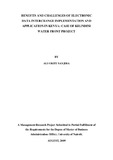Benefits and challenges of electronic data interchange implementation and application in Kenya: case of Kilindini water front project
Abstract
Many organizations are applying Electronic Data Interchange (EDI) to improve operational efficiency, enhance information quality, and achieve reductions in processing time of critically important business information. EDI today represents an opportunity to improve business processes and business controls directly even though challenges are expected. It is in light of the opportunities and challenges that this study is done, specifically focusing on the benefits and challenges of implementation and application of EDI in Kenya considering the case of Kilindini Waterfront Project. Data was collected from 45 managers of the firms selected using convenient sampling. The respondents were asked about perceived benefits of EDI application and perceived challenges of EDI implementation and application. The questionnaires were mainly hand delivered to the respondents. The data collected was analyzed with the use of frequency tables, proportion, percentages, cross tabulations and factor analysis using SPSS. Majority of the firms that were studied had less than 1,000 employees which may possibly mean the firms are less labor intensive and therefore relying more on automated processes. This study also show that most of the respondents were experienced with EDI implementation and application and therefore had the necessary knowledge sought for.
From the factor analysis carried out on the variables of the benefits of EDI application, the deduction drawn indicates that firms that apply EDI benefited. Some of the benefits include reduced errors, access to information, enhanced competitive capacity and improved trading partner relationship. Despite the benefits of EDI application, it was also found that there are several challenges encountered in the implementation of EDI. From the factor analysis carried out on the variables of the challenges in the EDI implementation, the deduction drawn indicates some of the challenges to be lack of top management support, negative staff attitude, inadequate IT staff training and inadequate non IT staff training.
This study also indicated that there were challenges encountered in the application of EDI. From the factor analysis carried out on the variables of the challenges of EDI application, the deductions drawn indicate some of the challenges to be inadequate
vi
non IT staff training, lack of trust of other EDI partners, lack of flexibility, lack of maintainability and lack of awareness of benefits of EDI. To overcome these challenges, it is essential first to establish dialogue between all parties involved to discern EDI implementation strategies and timelines long before EDI implementation. Inherent in the discussions for the partners involved is the joint planning and system specification that will facilitate the process of EDI implementation and application. It is also critically important to provide EDI education and help to the trading partners to increase the number of trading partners and the speed with which trading partners comply. This is because, education and training tends to overcome trading partner resistance to EDI and are necessary for the successful implementation and efficient use of the EDI system. User participation in planning, analysis, design, construction, and installation is also necessary for EDI project success. This also applies to the users of trading partners. Likewise, encouragement of the constant evaluation, continuous improvement, and ongoing exploration of new opportunities for EDI among all stakeholders is very important..
Publisher
College of Humanities and Social Sciences, University of Nairobi
Description
MBA Project

